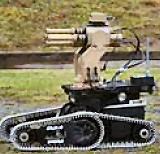 The folks at iRobot not only make the Roomba, which will robotically vacuum your floors and drive your dog insane, but also they make military iRobots, which will chase down and, er, vacuum up terrorists, enemy combatants, and other assorted malefactors. I, for one, would not like to see the bad boy pictured on the right chasing me down some hallway or alley. Not every iRobot, however, packs heat, and many perform certain defensive military missions such as handling and disabling IEDs, detecting chemical and biological warfare agents, and other cool stuff.
The folks at iRobot not only make the Roomba, which will robotically vacuum your floors and drive your dog insane, but also they make military iRobots, which will chase down and, er, vacuum up terrorists, enemy combatants, and other assorted malefactors. I, for one, would not like to see the bad boy pictured on the right chasing me down some hallway or alley. Not every iRobot, however, packs heat, and many perform certain defensive military missions such as handling and disabling IEDs, detecting chemical and biological warfare agents, and other cool stuff.
According to this recent post at Planetary Gear, the iRobot is attracting as much foreign interest as the iPhone and the iPod. And that, of course, raises a few export issues. Depending on how the robot is decked out, it can either be a killer robot of doom or WALL-E, the trashbot. The iRobot can be just as useful to first responders as to military troops.
A review of the iRobot product literature indicates that the company has played it safe and simply takes the position that the tactical iRobot is USML whether or not it’s been given the naughty or nice accoutrements. But technology is quickly outpacing the creaky old United States Munitions List, and it’s not very clear what is the correct USML category for the robot. Of course, there’s always Category XI: “electronic equipment . . . which is specifically designed, modified or configured for military application.” Or “catch-all” Category XXI for an article not enumerated in the other categories “which has substantial military applicability” and “which has been specifically designed, developed, configured, adapted or modified for military purposes.” But that seems rather unsatisfying, doesn’t it? Shouldn’t something this deadly have its own category?
And suppose that iRobot took a hard line position that a robot not outfitted with military gear but capable of being so outfitted wasn’t USML, what would be the ECCN of the robot?
(For those confused about the title, go here.)

 Posted by
Posted by  Category:
Category: 

 Earlier this week, Rep. Anthony Weiner (D-NY) introduced
Earlier this week, Rep. Anthony Weiner (D-NY) introduced  Back in 1997, the folks at Omega Engineering were very bad. They applied to the Bureau of Industry and Security (“BIS”) for a license to ship laboratory equipment to Pakistan. The license was denied. The appeal of the license denial was denied. They shipped the goods anyway with an intermediate stop in Newport, Germany. BIS was not amused. Omega
Back in 1997, the folks at Omega Engineering were very bad. They applied to the Bureau of Industry and Security (“BIS”) for a license to ship laboratory equipment to Pakistan. The license was denied. The appeal of the license denial was denied. They shipped the goods anyway with an intermediate stop in Newport, Germany. BIS was not amused. Omega  A Florida man and a California man who ran separate aviation parts businesses have been
A Florida man and a California man who ran separate aviation parts businesses have been 


